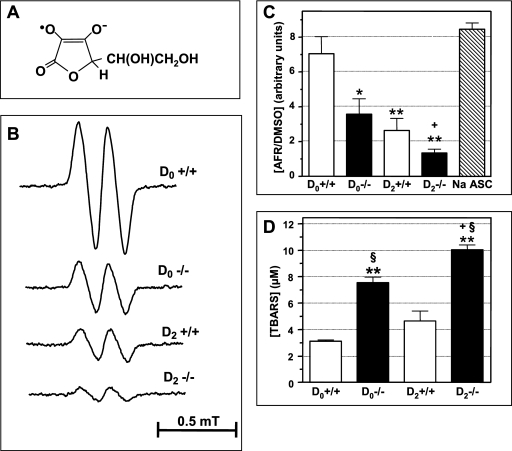FIG. 6.
Trp53inp1 deficiency decreases ascorbate levels in plasma, increases lipid peroxide content in plasma, and potentiates acute colitis-induced depletion of ascorbate and lipid peroxidation in plasma. Acute colitis was induced in WT (+/+) and Trp53inp1-deficient (−/−) mice by treatment with 3.5% DSS for 2 days (D2). D0 indicates samples from untreated animals. Ascorbate levels in plasma were assessed through ESR detection of AFR-DMSO doublets, and lipid peroxidation levels were determined by TBARS assay. (A) Chemical structure of AFR. (B) Selected ESR spectra from WT and Trp53inp1-deficient mice either untreated or treated for 2 days with DSS. (C) Means ± SDs (n = 5 to 7 mice per group) of AFR-DMSO concentrations in plasma from the different groups of animals calibrated to a similar signal yielded by 50 μM aqueous sodium ascorbate. (D) Means ± SDs (n = 5 to 7 mice per group) of TBARS concentrations in plasma. Untreated Trp53inp1-deficient mice show significantly decreased ascorbate levels in plasma and increased lipid peroxide concentrations compared to those of untreated WT mice. Trp53inp1-deficient mice are more susceptible than WT mice to acute colitis-induced ascorbate depletion and increased lipid peroxidation in the plasma. The statistics are based on the results of one-way ANOVA (P < 0.0002) followed by Newman-Keuls tests for intergroup differences. *, P < 0.01; **, P < 0.001 versus results for D0+/+; §, P < 0.001 versus results for D2+/+; +, P < 0.05 versus results for D0−/−.

